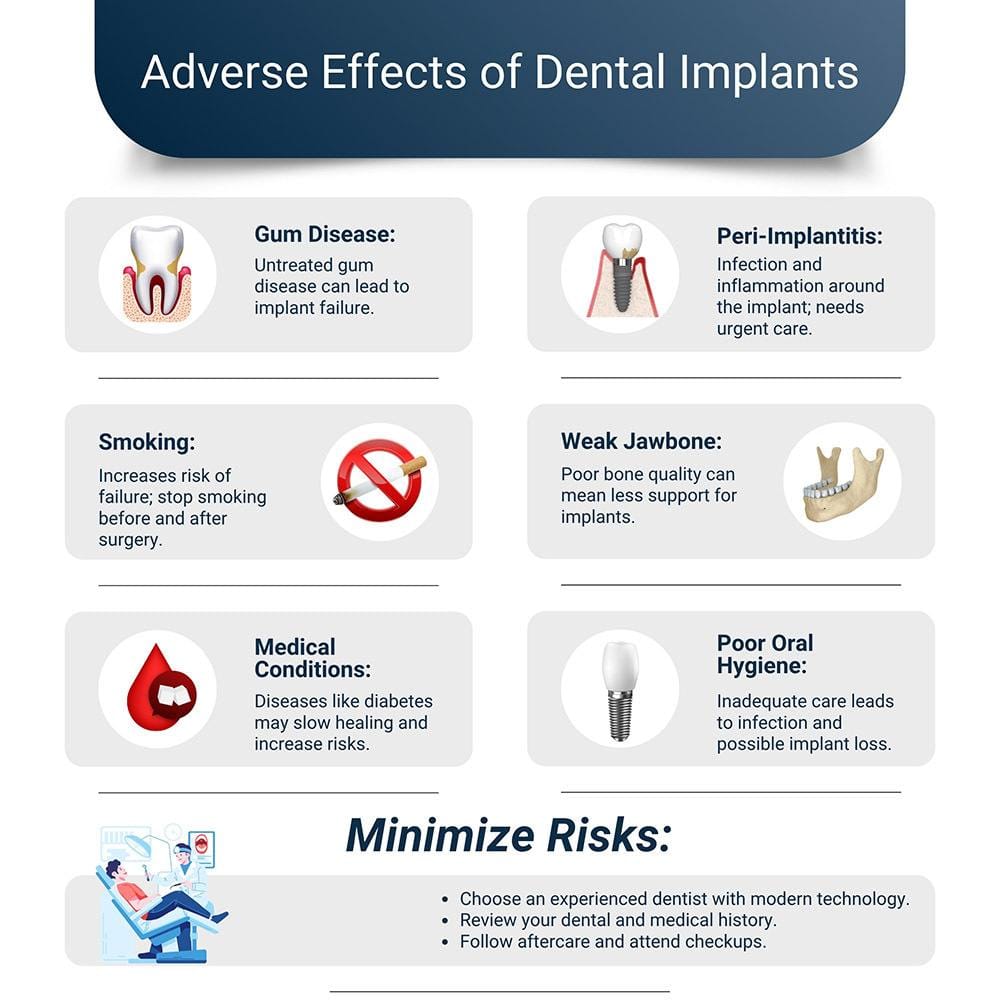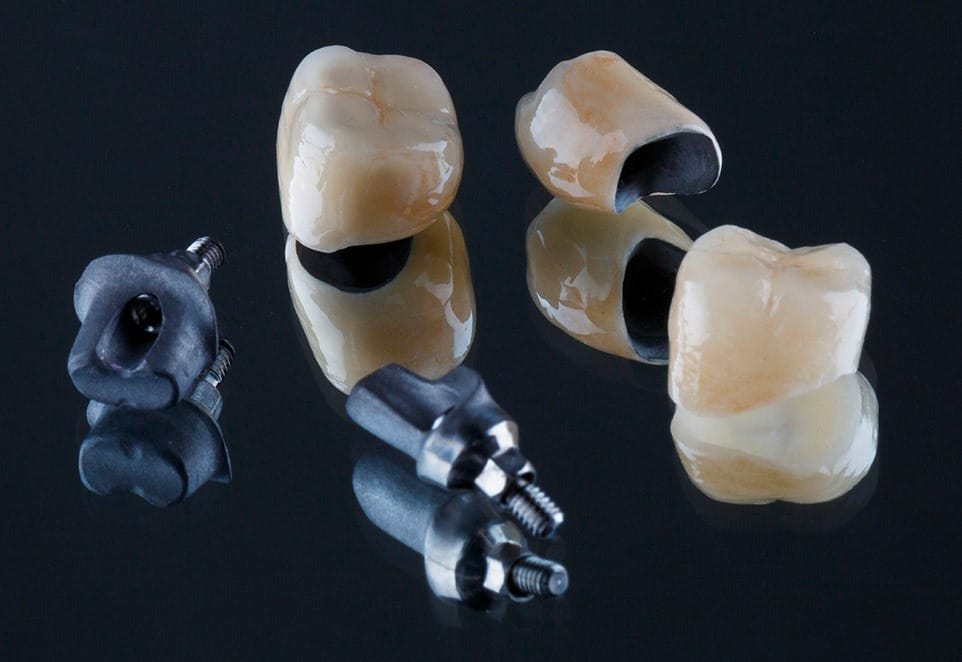If you are planning to have dental implants or already have them, here is what you need to know about treatment and the factors that could lead to failure.

Gum Disease
Advanced gum disease is probably the biggest risk for implant failure. Healthy gums are essential before dental implants are placed. If you have active gum disease, treatment to resolve this issue will be necessary.
Untreated gum disease can destroy the tissues around dental implants, eventually leading to failure as the implants become increasingly loose and unstable. If you suspect your gums have become infected after implant surgery, you must seek treatment urgently.
Peri-Implantitis
A condition called peri-implantitis is similar to gum disease and can result in the tissues around the implants becoming red, inflamed, and infected. It requires urgent treatment from an implant dentist who must clean around the implant professionally to remove all damaged tissues and harmful bacteria. Without treatment, implants can fail.
Smoking
Dental implants are at a higher risk of failure in smokers. Smoking constricts the blood vessels, making it harder for your body to send essential nutrients to the gums. It is also harder for your body to carry harmful toxins away from the gums. Also, smoking can mask common signs of gum infections, like gums that bleed easily.
If you smoke, you can still have dental implants, but you will need to quit for a while during treatment. After implants are inserted surgically into your gums, they need time to heal. If you smoke during treatment, healing is impaired, and there is a greater risk of implant failure.
Be prepared to stop smoking at least a week before dental implant surgery and to quit for at least two months afterward. Ideally, it is best to stop for good, and dental implant treatment can be a great incentive to look after oral health and protect your investment in your dental implants.
Poor Jawbone Quality
Successful dental implant treatment relies on a strong, healthy jawbone. Without this, implants may be inadequately supported, and the jawbone might not be strong enough to support new implant teeth successfully.
Jawbone deterioration can occur with advanced gum disease, a bacterial infection that destroys bone. The jawbone can resorb after tooth loss, especially after teeth have been missing for several years. Your tooth roots provide valuable stimulation to the surrounding bone, and jawbone resorption quickly occurs once they are removed.
Osteoporosis can affect the quality and quantity of the jawbone. Some medicines, particularly those given intravenously, used to treat osteoporosis, can also negatively impact jawbone health and cause jawbone necrosis, where the bone starts to crumble away.
Medical Issues
Certain autoimmune conditions can make it harder to heal after dental implant surgery. These conditions include diabetes and rheumatoid arthritis.
Slower healing can increase the risk of implant issues by interfering with osseointegration, preventing new bone from growing on and around the implant, and fusing the implant in place.
Some medications can also affect osseointegration after dental implant surgery.
Poor Oral Hygiene
Inadequate oral care can affect implant success. It is critical to maintain a meticulous oral hygiene routine after implant surgery and to ensure the implants and restorations are cleaned regularly and thoroughly.
Failure to do this allows food debris and harmful bacteria to build up. It is highly likely that you will develop infected and inflamed gums. Eventually, the infection and inflammation will spread to the bone around the implants, leading to failure.
If you struggle to clean your mouth thoroughly or feel you will have difficulty sticking to a regular oral care routine, dental implants may not be the best treatment choice.
How to Minimize the Risk of Adverse Effects During and After Your Dental Implant Treatment
Although the above issues can become serious, there is a lot you can do to minimize potential risks.
Choose the Right Dental Implant Dentist
Ensure you choose your dental implant dentist carefully, especially if you already have some dental problems or require multiple teeth to be restored. Look for a dentist with advanced training and plenty of experience.
Ideally, choose a multidisciplinary practice with several dental specialists on its team. If you have other issues requiring treatment, it is more likely that you can complete all the work required under one roof.
Ask About Their Technologies
Look for a dental practice with an on-site cone beam CT scanner. Other useful technologies include digital smile design.
Ensure your implant dentist uses computer-guided implant surgery for every treatment. This process utilizes your cone beam CT scan (a 3D scan of your teeth and jaws) to plan and place implants more accurately and comfortably.
A larger dental practice will likely have all this technology on-site and will routinely plan and place dental implants using computer-guided surgery.
Expect a Complete Dental Exam and Medical History Review
You will need a thorough dental examination, and your dentist must review your medical history thoroughly to determine if implants are right for you. They will also ask about your oral care routine and lifestyle habits.
If they think you are a suitable candidate, a cone beam CT scan will assess the quality and quantity of your jawbone. Not everyone has enough bone to support dental implants, but generally, this isn’t a problem as bone grafting can restore any bone inadequacies.
Make Sure You Understand Your Treatment Plan
After completing diagnostic tests, your implant dentist can provide a comprehensive treatment plan. They should explain this clearly and allow plenty of time to answer questions. There might be more than one option available, so make sure you know the differences between each and are advised of the predicted costs.
Ensure you feel entirely comfortable with the plan, understand it, and are happy to work with your dentist, as you will need to see them several times over several months or even longer.
Ask About Sedation Dentistry if You Feel Nervous
A good dental implant dentist will likely offer sedation dentistry routinely but be sure to ask if you feel anxious or nervous. A customized sedation plan will help you relax and feel more comfortable.
Follow After Care Instructions Carefully
After implant surgery, you will be given detailed information about how to look after your mouth during healing. It will include advice on keeping your mouth clean and which foods to eat. Follow the information closely as it is designed to reduce the risk of infection and ensure you heal more comfortably and quickly.
Schedule Regular Dental Exams and Hygiene Appointments
You must see your dentist regularly, usually at least every six months, for dental exams and hygiene appointments. These checks allow them to assess your implants’ condition and complete any necessary maintenance. They can also quickly detect if there are any problems like peri-implantitis.
Dental issues can be treated far more successfully and cost-effectively earlier. At Clock Tower Dental, professionally cleaning your implants will also help ensure they remain strong, healthy, and problem-free.

